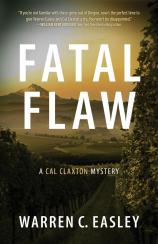Interview: May 11, 2023
When greed runs rampant, murder can’t be far behind. That’s the intriguing tagline of Warren C. Easley’s ninth Cal Claxton mystery, FATAL FLAW, which finds the small-town lawyer up against two killers --- a ruthless murderer and a deadly virus. In this interview conducted by Michael Barson, Senior Publicity Executive at Melville House, Easley talks about the difference between writing this book and the eight previous installments, the writers whose novels inspired him to try his own hand at a mystery series, and his plans for Cal in book 10.
Question: FATAL FLAW is your ninth Cal Claxton novel. When you wrote MATTERS OF DOUBT back in 2013, did you ever imagine you’d eventually have nine of them under your belt? What was your original goal?
Warren C. Easley: I always envisioned a series, but I didn't dream I would have nine books a decade later! My original goal was to get MATTERS OF DOUBT published, period. I had two other manuscripts squirreled away, and Poisoned Pen Press wanted three books initially. When I re-read the other two, I realized they needed to be completely rewritten. I'd grown as a writer!
Q: The Oregon setting of the Cal Claxton mysteries is much less common than such widely utilized settings as Los Angeles, New York and Miami, to name just a few. Was there an Oregon series forerunner whose books helped inspire you to try writing your own?
WCE: It wasn't an Oregon series, actually. It was James Lee Burke's Dave Robicheaux novels that inspired me! They're fast-paced, character-driven mysteries, but what I was most drawn to was his wonderful evocation of the Gulf coast setting. I wanted to feature Oregon the same way in my books --- the beauty of the place and the remarkable people who live here.
Q: Now looking back on MATTERS OF DOUBT, with the benefit of having written eight subsequent novels, what is the main lesson you learned that you wish you had known when writing that first book?
WCE: I've learned so many writing lessons in the course of this series, most of them painful! The one that stands out is to trust the process --- to know that if I keep writing, the story will evolve. I don't outline my books. Instead, I start with an initial concept and small cluster of characters, and then I allow the story to evolve organically. If I'm lucky, I can see a couple of chapters ahead, so the process can be stress-inducing. But it works for me!
Q: With the threat of COVID-19 fueling the plot of FATAL FLAW, you’ve expanded the parameters of the story beyond those Cal has dealt with in most of your previous novels. How did it feel to exercise your brain muscles from your previous career as a scientist?
WCE: It was fun injecting a little science into Cal's life, and it was serendipitous, too. I was browsing the internet --- not researching --- when I ran across an article touting a spectroscopic technique for detecting coronaviruses very rapidly. Since I was a spectroscopist in a previous life, this caught my eye, and the timing was right because I was in the middle of deciding the course of book nine. I got to thinking about what a test like that could be worth as the pandemic closed in, and how the quest to own such an invention could lead to murder and mayhem. I was off to the races after that!
Q: Before you became a published author, who were the writers whose books inspired you to try your own hand at creating a mystery series?
WCE: As I mentioned above, James Lee Burke gave me a sense of what a character-driven series with a strong sense of place could be. But I was also strongly influenced by several other writers. Walter Mosley's Easy Rawlins series inspired me to make Cal Claxton an everyman, a character people can root for. Michael Connelly's Bosch novels showed me how a complex plot can evolve with pace and clarity, and Sara Paretsky's V.I. Warshawski was a character with grit and determination, qualities I wanted Cal to exhibit. Elmore Leonard showed the importance of authentic dialogue, and how to use that dialogue to keep the story moving.
Q: A lot of crime and mystery novelists over the years have created a second protagonist to alternate with their original one --- Robert B. Parker, James Lee Burke, C. J. Box and John Sandford all come to mind. Have you ever pondered the idea of creating a new protagonist and juggling two series in alternate years?
WCE: So far, the concept for the next Cal book seems to come very quickly and demand to be told. And that was the case for book 10 (which is half-finished), in which Cal goes back to his roots in L.A. and discovers that when he left in the aftermath of his wife's suicide, not all was as it seemed. I'm really excited about this book. But after I finish it, who knows?




